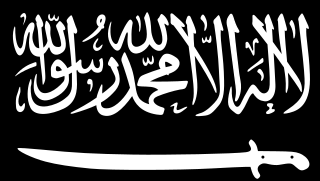In June 2000, the North Caucasian Chechen separatist-led Chechen insurgents added suicide bombing to their tactics in their struggle against Russia. Since then, there have been dozens of suicide attacks within and outside the republic of Chechnya, resulting in thousands of casualties among Russian security personnel and civilians. The profiles of the suicide bombers have varied, as have the circumstances surrounding the bombings.

The Caucasus Emirate, also known as the Caucasian Emirate or Emirate of Caucasus, was a terrorist Jihadist organisation active in rebel-held parts of Syria and previously in the North Caucasus region of Russia. Its intention was to expel the Russian presence from the North Caucasus and to establish an independent Islamic emirate in the region. The Caucasus Emirate also referred to the state that the group sought to establish. Partially a successor to the secessionist Chechen Republic of Ichkeria, it was officially announced on 7 October 2007, by former President of Ichkeria Dokka Umarov, who became its first emir.

The insurgency in the North Caucasus was a low-level armed conflict between Russia and militants associated with the Caucasus Emirate and, from June 2015, Islamic State of Iraq and the Levant (ISIL) groups in the North Caucasus. It followed the official end of the decade-long Second Chechen War on 16 April 2009. It attracted people from the Middle East, North Africa, Europe, and Central Asia, who then participated in the conflict, but volunteers from the North Caucasus were also fighting in Syria.
Aslan Avgazarovich Byutukayev, also known as Emir Khamzat and Abubakar was a Chechen insurgent commander in the Islamic State (IS) Wilayah al-Qawqaz, the commander of the Riyad-us Saliheen Brigade of Martyrs and a close associate of the deceased Caucasus Emirate leader Dokka Umarov. Byutukayev was listed as a Specially Designated Global Terrorist by the United States on 13 July 2016. He was killed by Russian special operatives in January 2021.

Aliaskhab Alibulatovich Kebekov, also known as Ali Abu Muhammad, was a Dagestani militant Islamist in Russia and the leader of the Caucasus Emirate following the death of inaugural leader Dokka Umarov. Following in the same religious tradition as Umarov, he adhered to the ideology of Salafism. The United States Department of State added Kebekov to its list of Specially Designated Global Terrorists on March 25, 2015. On 19 April 2015, Kebekov was killed by Russian security forces during special operations in the settlement of Gerei-Avlak in Buynaksk. An Avar by nationality, Kebekov was the first non-Chechen to lead the North Caucasus insurgency.

The 2014 Grozny bombing was a terrorist attack in the city of Grozny, Chechen Republic, Russia. On October 5, 2014, a 19-year-old man named Opti Mudarov went to the town hall where an event was taking place to mark Grozny City Day celebrations coinciding with the birthday of Chechen President Ramzan Kadyrov. Police officers noticed him acting strangely and stopped him. The officers began to search him and the bomb which Mudarov had been carrying exploded. Five officers, along with the suicide bomber, were killed, while 12 others were wounded.

On 4 December 2014, a group of armed militants of the jihadist organization Caucasus Emirate attacked a traffic police checkpoint outside the city of Grozny, Chechnya, Russia. The militants then entered the city and occupied the "Press House" building in the city center and a nearby school.

The Islamic State – Caucasus Province was a branch of the militant Islamist group Islamic State (IS), that was active in the North Caucasus region of Russia. IS announced the group's formation on 23 June 2015 and appointed Rustam Asildarov as its leader. Although it was destroyed by 2017, some lone wolves acted on behalf of the Caucasus Province for several years afterwards.





